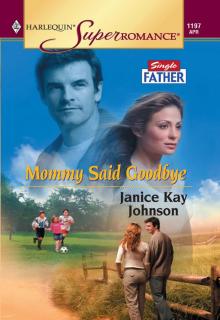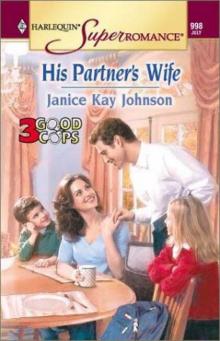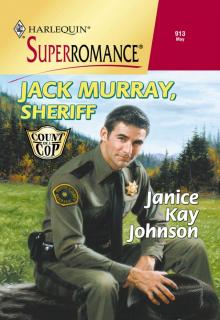- Home
- Janice Kay Johnson
The Perfect Mom Page 5
The Perfect Mom Read online
Page 5
“Do you have a contract for me to sign?” she asked.
He produced that, too, and went over it line by line. Satisfied, Kathleen signed, and hoped Ryan wouldn’t have recommended Logan Carr if he weren’t reliable.
“I can’t start for a week,” he was telling her. “I’m finishing up a project in West Seattle, but I can be on it a week from tomorrow, if that works for you.”
“So soon?” she said in surprise. Wasn’t spring a busy season for construction? Why wasn’t he booked way in advance, if he was so good?
As if reading her mind, he said, “I had a cancellation, and my next job is new construction. They won’t be ready for me for a few weeks. This is good timing for me.”
She flushed, as embarrassed as if she’d spoken her doubts aloud. “Oh. Well.” She forced a smile. “It’s good luck for me, too.”
He nodded absently and sipped his coffee, instead of standing to leave. “Nice house. Lots of potential.”
Her mood lifted. “Do you think so?”
He was looking around, his gaze taking in the original moldings and high ceilings. “Your brother grumbled one time that you’d dropped your money into a sinkhole. I think he’s wrong. This could be a beauty.”
“I think so, too.” She had this vision no one else seemed to share, but she could see on his face that he saw something similar. “We’ve actually remodeled a couple of rooms already.” She tried to sound casual. “Do you want a grand tour before you go?”
He set down the mug. “Love one.”
“You can finish your coffee.”
“It’ll keep me awake anyway.” He gave another of those crooked, devastating smiles. “Lead on.”
Pulse bouncing, Kathleen stood, too. “You’ve seen the pantry.”
“You’re lucky to have one. They’re a smart addition to a kitchen.”
She smiled wryly. “Of course, we’re back to storing baking supplies in cupboards too high to reach without teetering on a chair, thanks to the soap.”
“But what would you do if you didn’t have the pantry?” Logan pointed out.
Kathleen made a face. “How true. I’d probably be stepping over bars of soap to go to bed.”
He laughed, a low, rough sound, as well-worn as the calluses on his hands.
She showed him the living room, and he admired the arched entry and the built-in, leaded glass-fronted bookcases to each side of the brick fireplace.
“You planning to refinish the floor?”
“Ryan is itching to tackle it, but I’ve held him off so far. Where would we live while fumes fill the house?”
“That’s always a problem,” the cabinetmaker conceded. “But without a finish this floor is going to get scratched and stained.”
She sighed. “You sound like my brother.”
“We both value fine woods.”
Ian had valued fine wines, she thought irrelevantly. Their house had been a showplace in Magnolia, but it was no more than an appropriate and deserved backdrop, as far as he was concerned. The house had given her pleasure. These days, she tried not to think about the gleaming inlaid floors, stained-glass sidelights and granite kitchen counters.
If she ever had a beautiful house again, she would have earned it herself, and that had come to mean more than the possessing. In his eagerness to help her, Ryan refused to understand that. She had the odd feeling that Logan would.
She led him to the downstairs bathroom, really more of a powder room in the traditional sense.
He stepped past her and, filling the opening, contemplated the tiny room. “Nice,” he said finally.
Feeling a glow, she said, “Thank you. We did it ourselves.”
He glanced at her, surprise in his raised brows. “We?”
“Jo, Helen and I did the work. Especially Jo,” she admitted. “Except for the plumbing. We called Ryan for that.”
He took another look. “You did a hell of a job.”
They had, if she did say so herself—although she felt a little immodest even thinking as much, given how little she’d contributed compared to Jo. Still…
The floor and walls, up to the wainscoting, were covered with two-inch tiles the color of milky coffee, with darker grout. The sink was a graceful free-standing one, the medicine cabinet an antique Jo had discovered at a garage sale. They’d splurged on a reproduction toilet with an old-fashioned oak tank. A cream, rose and spring-green paisley paper covered the upper walls. Just stepping in here made Kathleen happy. At least they’d accomplished something, even if the floors in the rest of the house were still scuffed, the plaster peeling in the stairwell, the kitchen a 1940s nightmare.
“We’ll skip our home office,” she nodded down the hall. “It’s a disaster. That door leads to the basement, which at the moment is our construction workshop, such as it is, and has the washer and dryer. We’ve all got piles of boxes stored down there, too.”
As she climbed the stairs, Kathleen was very conscious of him behind her. She wondered if he was at all aware of her as a woman. Or—she didn’t know why it hadn’t occurred to her—was he married? She glanced back and made a point of noticing his left hand—no ring. Which didn’t necessarily mean a thing. Not all men liked wearing a wedding ring. For one who worked with power tools, wearing a ring might be dangerous.
He hadn’t mentioned children of his own, she remembered.
It wouldn’t hurt to make conversation, she decided.
“Do you have kids?” she asked casually, as they reached the hallway above.
“Afraid not.”
Frustrated, she nodded at the first bedroom door, shut. “Jo’s room. Then Helen’s.”
This door stood half open, and without stopping he glanced in at the high-ceilinged room. “No closets?”
“A couple of the bedrooms have them, but small ones. What would be wonderful, down the line, is to eliminate one of the four bedrooms and create big walk-in closets for the other rooms.” She laughed ruefully. “Wa-ay down the line.”
“You have to have a plan,” he said matter-of-factly.
He believed in dreaming. She liked that about him. Maybe he didn’t actually swill beer and belch.
But maybe he had a wife at home, washing up their dinner dishes, wondering why he was taking so long to present a bid for a small job.
She opened the door on the other side of the hall with a flourish. “And the other bathroom.”
Every time she stepped in here now, she had a flash of memory—Emma sprawled, unconscious and bleached-white, on the tiled floor. Death was an all too real possibility for Emma, but that morning, it had hit Kathleen like a punch in the stomach.
Emma is dead. I’ve failed her.
She crossed her arms and squeezed, momentarily chilly. Logan gave her a sharp look but didn’t comment. Instead he examined this larger bathroom and gave another nod of approval.
“I could have done a better job on the cabinets, but it looks great.”
“They’re ready-made,” she admitted.
“I know.” He propped one shoulder on the door-jamb and smiled. “Sorry. I think I just crossed over from confidence to cockiness.”
She found herself smiling back, probably foolishly. “No, no. I’m sure I heard nothing but confidence.”
His eyes seemed to darken, his voice to deepen. “Thank you for that.”
Cheeks warming, she backed away. “Um…my bedroom is the last,” she flapped a hand toward the end of the hall, “but I haven’t done anything except cover the floor with a rug and the peeling wallpaper with pictures.”
He glanced that way thoughtfully, then nodded, accepting her unspoken reluctance to show him her private sanctum. Her bedroom. Ryan was the only man to have stepped foot into it, and that was on moving day when he’d helped carry in the garage sale and thrift store furniture.
She found the idea of this man in her bedroom disturbing. It wasn’t so much the notion of him studying her bed with that contemplative gaze as the fact that he would be out of place. Ridic
ulously so. She imagined his bedroom as spare, with white walls and beautiful wood pieces and perhaps a simple print hung above the bed. Maybe not even blinds or curtains at the window.
Unless, of course, his wife had decorated their house.
Ian had liked their master bedroom luxurious but modern, the deep plush of the charcoal-gray carpet unadorned, the vast bed the centerpiece of the room, the only other focal point the wall of windows looking out at Puget Sound and passing ferries.
To please herself, and because she couldn’t afford luxurious anyway since she’d refused alimony and a split of the possessions she had realized were really his, Kathleen had indulged in a very feminine bedroom for herself, in this house that was her own. Dried hydrangeas and roses filled cream-colored pitchers and vases. The cherry bed frame needed refinishing, but she never noticed, so heaped was the bed with lacy pillows and quilts and a crocheted spread she’d bought for peanuts at the Salvation Army because it had been stained. Armed with a book on caring for old fabrics, she had resuscitated it as well as the pink and white pinwheel quilt the mover had been using as padding, and the lace that edged several of the pillows. Whenever she saw an unusual old picture frame for a price she could afford, she bought it, and had covered the walls with family photos dating back to the 1840s and ending with a laughing Emma, caught only a few months back in an unwary moment. Kathleen’s dresser top was cluttered with her collection of ceramic and wood boxes. A caned Lincoln rocker that had been handed down in her mother’s family gave her a place to sit and read by the light of a Tiffany-imitation lamp that sat on a carved end table, its battered top hidden beneath a tatted doily.
Emma, of course, sneered at the room. “It’s old stuff. Dad would say it was all junk and throw it away.”
So he would—which was very likely the reason she’d decorated the room the way she had.
Kathleen had managed to keep her voice mild. “Old stuff is all I can afford. You know that.”
Emma, dear Emma, had flared, “And it’s all my fault that we’re poor! Of course! I didn’t ask you to leave Daddy!”
She hadn’t had to ask, not after the horrific scene when Ian had lost his temper, held her down and shoved food into her mouth.
“Look at it this way,” Logan Carr said now. “Not a penny spent on this house is wasted. You’ll get it all back if you re-sell. These old houses can’t do anything but gain value.”
“Even Ryan concedes as much.”
Logan gave her a quizzical glance. “I take it you and your brother aren’t close?”
“Actually, we are.” She smiled at his surprise. “Jo says we squabble like a couple of kids on a family vacation. Insulting, but accurate.”
He laughed again, which pleased her. She liked his laugh.
“Well, I’d best get out of your hair,” he said, pushing away from the door frame. “You must have a million things to do.”
Like climb into bed, pull the covers over her head and pretend all her troubles would go away. Or cry. She hadn’t decided which.
“Well, not a million, I hope,” she said with a practiced chuckle. “You probably have plenty waiting for you at home, too.”
He opened his mouth and then closed it. She saw the impulse to say something and the instant when he thought better of it.
“Unfortunately,” he agreed.
She couldn’t help but wonder what he’d been going to say. Nobody and nothing is waiting for me at home? Or, Yeah, the wife insists I fix the leak under the kitchen sink tonight?
She saw him to the door, chattering about nothing in particular, another skill acquired from the years of entertaining Ian’s business associates.
There, she said, “We’ll look forward to seeing you a week from Monday.”
“Actually, you’ll only see me if I need additional measurements. I’ll build the cabinets at home and call you when I’m ready to install them.”
“Oh.” She was embarrassed not to have realized as much, and inexplicably disappointed. “Yes. Of course. I wasn’t thinking.”
With a shrug, he said, “You figured they weren’t ready-made, they got built here. That’s reasonable.” He paused, his gaze intent. “Ms. Monroe…”
“Kathleen. Please.” Her heart seemed to be pounding.
The cabinetmaker nodded. “Kathleen. I don’t suppose…” He stopped, frowned fiercely, and shook his head. “Never mind.”
“What?” She wanted to stomp her foot.
“No.” His expression was stolid again. “It was just a passing thought. Nothing important.” He held out a hand. “I look forward to doing some work for you.”
What could she do but hold out her hand in turn? His was big, warm and rough-textured. It seemed to her that he released her hand reluctantly before nodding one more time and heading down the porch steps.
Tempted to watch him go, Kathleen made herself shut the front door. She was too old for delusions of passion and romance.
EMMA SAT AT THE TABLE in the dining hall and stared at her dinner tray. They could not possibly expect her to eat all that!
She sneaked a glance around and saw that a few of the other women and girls—right now, there wasn’t a single guy here—had matter-of-factly picked up silverware and started to eat. Maybe they had figured out some way to get away from their captors long enough to puke up all this food. Or maybe they had decided eating was the only way out of here. It wasn’t like they couldn’t lose the weight again.
Emma just didn’t want to. Gaining ten or twenty pounds, just so she could go home… She shivered at the thought. She’d be fat!
Reluctantly she picked up her fork and stabbed a few peas. Okay. She guessed she could eat them. They were starchy, but still a vegetable. Then maybe if she stirred some of the other food, made it look like she’d eaten some, they’d let her go.
The peas seemed to stick in her throat. She reached for her milk and gagged when she tasted it.
“It’s whole milk,” the girl beside her said. “Or maybe two percent. I’m not sure.”
“Even my mom buys nonfat!”
“Yeah, but this has more calories.”
Beads of sweat stood out on Emma’s brow. “I can’t eat this.”
“You have to. They make you sit here until you do.”
“All of it?”
“Didn’t they tell you?” The girl was really pretty, with shiny thick black hair, and so slim, lots slimmer than Emma was.
“They said I had to eat what they served, but I didn’t figure they meant, like, every bite.” She stared again in dismay at the pork chop, mashed potatoes and gravy and peas.
“I sat here for four hours my first day. The meat was even grosser when it was cold.”
Emma took a tentative bite of mashed potato. It slipped down easier than the peas had. “What’s your name?”
“Summer Chan. What’s yours?”
“Emma Monroe.”
“How much do you weigh?”
“Seventy-six pounds.” Emma was embarrassed. “I wish I looked like you do.”
“But I’m only five-two.” She took a dainty bite and swallowed. “You look great. I’m the one who’s still fat. No matter what they say.”
Emma didn’t ask what she weighed. She’d end up being totally humiliated.
“Do they ever get so they trust you, and you can go to the bathroom and stuff alone?”
“No.” She took another bite. “I’ve been here before. If you want out, you have to cooperate.”
Emma poked at the pork chop. “I’m a vegetarian.”
“You had to tell them you were when you checked in. Now it’s too late. They’ll think you’re lying.”
Emma hadn’t been a vegetarian until she decided meat had too much fat in it. Now…her stomach quivered at the thought. It was almost like being hungry, but more like she needed to throw up.
Summer took a bite of hers and murmured out of the corner of her mouth, “You’d better look like you’re eating. Here comes Karen.”
Karen was one of the nurses. She was stocky, with chunky arms and shoulders and a thick neck. The idea of ending up looking like her scared Emma.
She paused right behind the girls. “How are you doing, Emma? Doesn’t look like you’ve eaten much yet.”
“I had some peas. And potatoes.”
She laid a hand briefly on Emma’s shoulder. “Remember the rules. You have to eat it all. You can’t get well if you don’t eat.”
When she moved on, Emma muttered, “She means, get fat.”
“Just keep eating,” a woman across the table advised. “It’s easier if you don’t think about it. By the way,” she added, “I’m Regina Hall.”
“Nice to meet you,” Emma said automatically.
Not think about it. Right. How did you do that? She always thought about what she ate! She knew how much fat and calories every bite had, how full it would make her, whether she’d feel like a pig after she was done scarfing it down. To just eat and eat and eat…
“I won’t,” she said, and put down her fork.
“Suit yourself.” Regina, who was maybe in her early twenties, shrugged. “I’d rather watch TV than sit here all night. Even if it is reruns.”
“Everybody watches Friends,” Summer chimed in. “Monica is so-o pretty. Don’t you think?”
“I wish I looked like her,” Emma agreed. “I like to cook the way she does, too.”
Everyone at the table joined in to talk about Friends and whether Phoebe was too fat and how cool it would be to have a job as a chef as long as you didn’t have to sample anything and which was the hottest guy on the show.
Joey, most of them agreed, although Summer didn’t say anything and Emma didn’t think any of them were that hot. They were old, for one thing. Her uncle Ryan was better-looking than any of them. Her friends, back when she had some, always said he was super hot compared to their fathers or uncles or any of the teachers.
Emma guessed her dad was, too, but now when she thought of him all she could remember was his face contorted with rage and the cruelty of his hands and the terror of not being able to breathe when he shoved food into her mouth until it was smeared all over her face.

 Home Deadly Home
Home Deadly Home From Father to Son
From Father to Son All the Lost Little Horses (A Desperation Creek Novel Book 2)
All the Lost Little Horses (A Desperation Creek Novel Book 2) Hide the Child
Hide the Child Within Range
Within Range Between Love and Duty
Between Love and Duty First Comes Baby
First Comes Baby Charlotte's Homecoming
Charlotte's Homecoming In A Heartbeat (HQR Superromance)
In A Heartbeat (HQR Superromance) The Call of Bravery
The Call of Bravery In Hope's Shadow
In Hope's Shadow Anything for Her
Anything for Her Harlequin Superromance September 2014 - Bundle 1 of 2: This Good ManPromises Under the Peach TreeHusband by Choice
Harlequin Superromance September 2014 - Bundle 1 of 2: This Good ManPromises Under the Peach TreeHusband by Choice The Baby Agenda
The Baby Agenda More Than Neighbors
More Than Neighbors Her Amish Protectors
Her Amish Protectors All That Remains
All That Remains Whisper of Revenge (A Cape Trouble Novel Book 4)
Whisper of Revenge (A Cape Trouble Novel Book 4) In a Heartbeat
In a Heartbeat A Mother's Claim
A Mother's Claim Because of a Girl
Because of a Girl Back Against the Wall
Back Against the Wall Dangerous Waters
Dangerous Waters Mommy Said Goodbye
Mommy Said Goodbye A Mother's Secret
A Mother's Secret See How She Runs (A Cape Trouble Novel Book 2)
See How She Runs (A Cape Trouble Novel Book 2) Plain Refuge
Plain Refuge Bringing Maddie Home
Bringing Maddie Home For the Girls' Sake
For the Girls' Sake Through the Sheriff's Eyes
Through the Sheriff's Eyes Yesterday's Gone (Two Daughters Book 1)
Yesterday's Gone (Two Daughters Book 1) All a Man Is
All a Man Is Harlequin Superromance January 2014 - Bundle 1 of 2: Everywhere She GoesA Promise for the BabyThat Summer at the Shore
Harlequin Superromance January 2014 - Bundle 1 of 2: Everywhere She GoesA Promise for the BabyThat Summer at the Shore No Matter What
No Matter What Wakefield College 01 - Where It May Lead
Wakefield College 01 - Where It May Lead Someone Like Her
Someone Like Her THE WORD OF A CHILD
THE WORD OF A CHILD Harlequin Superromance May 2016 Box Set
Harlequin Superromance May 2016 Box Set Open Secret
Open Secret The New Man
The New Man Finding Her Dad
Finding Her Dad The Perfect Mom
The Perfect Mom All Through The House
All Through The House Match Made in Court
Match Made in Court Making Her Way Home
Making Her Way Home From This Day On
From This Day On To Love a Cop
To Love a Cop The Hero's Redemption
The Hero's Redemption HIS PARTNER'S WIFE
HIS PARTNER'S WIFE Jack Murray, Sheriff
Jack Murray, Sheriff Dead Wrong
Dead Wrong Twisted Threads (A Cape Trouble Novel Book 3)
Twisted Threads (A Cape Trouble Novel Book 3) Bone Deep
Bone Deep The Closer He Gets
The Closer He Gets With Child
With Child Whose Baby?
Whose Baby? Kids by Christmas
Kids by Christmas